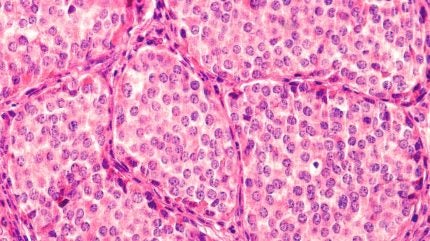
New guidance from the National Institute for Health and Care Excellence (NICE) recommends that patients with neuroendocrine tumours (NETs) in the liver could benefit from a therapy that targets the tumours with radiation.
Selective Internal Radiation Therapy (SIRT), a procedure which limits radiation exposure to surrounding tissue, involves injecting radioactive spheres into the artery that takes blood to the liver. The microspheres deliver targeted radiation that kills the cancer cells.

Discover B2B Marketing That Performs
Combine business intelligence and editorial excellence to reach engaged professionals across 36 leading media platforms.
Dr Sachin Modi, consultant interventional radiologist/oncologist at University of Southampton said: “Research shows that NETs, as a collective group, is the tenth most prevalent cancer in England.
“With the increasing incidence of NETs diagnoses, it is critical that there are a variety of treatment options that enable clinicians to improve patient care.”
From reviewing evidence on the safety and efficacy of SIRT, which looked at treatments including Boston Scientific’s TheraSphere Y90 Microspheres, NICE found that the procedure may result in fewer side effects, faster recovery times, and better quality of life for patients compared with surgery or chemotherapy.
According to the NICE committee that made the recommendation, neuroendocrine tumours that have metastasised to the liver may be more suitable for SIRT than other types of tumours in the liver because they are usually hyper vascular.

US Tariffs are shifting - will you react or anticipate?
Don’t let policy changes catch you off guard. Stay proactive with real-time data and expert analysis.
By GlobalDataIn addition, the committee concluded that SIRT is likely to be better tolerated than other intra-arterial therapies since it relies on radiation rather than embolic effect to kill the tumour cells.
Xavier Bertrand, vice president of peripheral interventions for Boston Scientific commented: “Targeted, minimally invasive cancer treatment can improve patient outcomes and reduce pressure on healthcare systems where staff shortages are compounding the challenge of timely diagnosis and care.
“We’re excited that this guidance means more patients could benefit from this therapy and more broadly that it addresses disparities in access to healthcare.”
Boston Scientific previously reported positive data from the Phase III EPOCH clinical trial of its TheraSphere treatment in patients suffering from metastatic colorectal cancer (mCRC) of the liver.
The trial met the primary endpoints of progression-free survival (PFS) and hepatic progression-free survival (hPFS).





